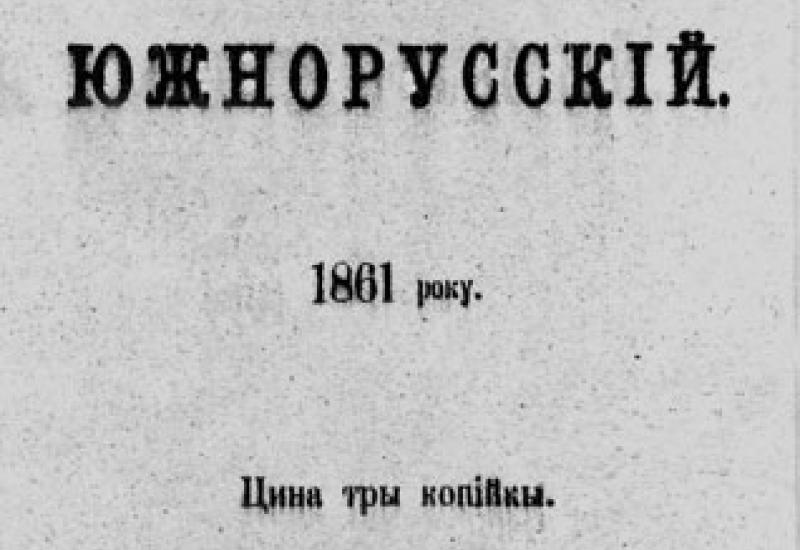Taras Shevchenko is a prominent Ukrainian poet, novelist, playwright, painter, political and public figure. He was all-round talented man with diverse interests. Taras Shevchenko devoted his life to the Ukrainian nation. Independent Ukraine full of happy people respecting mother-tongue and theirs own history was his main dream.
Shevchenko's literary heritage it's a 240 poems, among of them is more than 20 poems; drama "Nazar Stodolya"; 20 stories (extant 9); diary; autobiographies; two parts of unfinished dramas. Shevchenko's works have been translated into nearly 100 languages. Shevchenkoäs Artistic heritage are 210 watercolors, mainly landscapes; 150 portraits, including 43 self-portraits; 27 etchings from which - 6 series "Picturesque Ukraine"; More than 230 pencil drawings of landscapes of Ukraine; drawings, sketches, sketches - 360 pages of manuscripts and albums.
"Bukvar pivdennorusky" is the last Shevchenko's book but it borrows a special place among of his wheen lifetime publications. This book composed of the best samples of folklore and partly of his own works for teaching children how to read and write Ukrainian language in Sunday schools.
"Bukvar" was released a relatively large circulation (10 thousand copies) of the author means. Moreover, the money from the sale of this book put in to the needs of country and Sunday schools. This fact confirms that Shevchenko paid great attention to the education problems. However, this book was the cheapest among similar publications and was available to the general public. Shevchenko was selling it for the price of 3 coints.
Since the "Bukvar" emergence passed 150 years (1861). Taras Shevchenko thought about creating a series of books that would give elemental knowledge to the country and sunday schools students. "There was an idea to publish counting book after " Bukvar " for the same value and price. After counting book- ethnography and geography at 5 coints price. And the Ukranian history book at 10 coints. "- shared Shevchenko in a letter to M.K Chaly 4 January 1861. But poet's death prevented the implementation of these plans.
Sunday schools it was free of charge schools for adults in pre-revolutionary Russia, working on Sundays and holidays and provideed primary education. They were opened by progressive public in the late 50's - early 60-ies of the nineteenth century. One of the first Sunday schools was founded in 1858 in Poltava. 8 January 1860 on the initiative of Russian surgeon M.I Pirogov was opened Sunday school teachers Pyryatyn county schools. In March 1860 Sunday school opened by teachers and high-school students at the Poltava gymnasium, and after it they began to open it in many cities and villages. In 1862 in Ukraine there were more than 110. There was teaching in Ukranian language in many of these schools. But in this 1862 theimperial government decided to close Sunday schools, and many of the organizers and teachers of these schools were arrested.
Introducing Shevchenko's "Bukvar" in public schools ran into resistance from the school administration and top clergy, including Bishop Filaret of Chernigov and Kiev Metropolitan Arseny. The Directorate of censorship "Bukvar Yuzhnorussky" was rejected as a textbook.
"Bukvar Yuzhnorussky" has the following sections: alphabet, syllables, numbers, counting, text material on which you can learning to read. Bukvar contains folklore wrightings as proverbialism and sayings, people's thoughts on which T.G Shevchenko wanted to construct the future young souls of educated compatriots.
Translated parts in Ukranian of "David's psalms" by Taras Shevckenko is given as reading material (12, 53, 93, 149), which deal with the fraternal relations between people and expressed the belief that oppressor will face with the judgment "for their cheating and bleeding actions" completely gives in his translation of psalm 132:
Is there something better in the world,
Than living in a pile
With good deed brother it is good
To behold and not divide?
The author presents folkloric texts - saying that oriented adopting folk and Christian values: Lies have short legs; Don't fight with the strong one, don't sue the rich one ; Fish and guests smell after three days.
"Duma about Popovich Oleksy from Pyratin" and "Duma about Marusia Popivna Boguslavka" were included as material to the "Bukvar" .
When "Bukvar" was printed Shevchenko immediately began to send it to various provinces of Ukraine. On this occasion, in a letter to F.L.Tkachenko he wrote: "I send you 10 "Bukvar" for showing, with offices and transports you will get 1000, and without opening the package, pass it to, who's a senior over you on Sunday schools? So, pass it to him. And let him to sell it, and then let him to put money in cash of Sunday schools. And you know ... Give a "Bukvar" to "Gubernskyh Vedomostey" editor and ask him to print that so-and-so "Bukvar" is "for sale" just for 3 coints in favor of Sunday schools. "
So, despite the fact that Shevchenko did not work in the education system and did not have works, which have specifically educational issues there is the reason to talk about his great interest in educational issues, and that he had developed views on pedagogic system. These views were partly reflected in his poetry, mostly in prose works (novels and diaries). Their implementation was peculiar writing and publishing "Bukvar Yzhnorussky."

